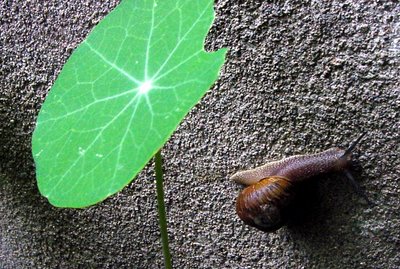
We had a good rain this afternoon, the first in about five days. Sadly, good rain always brings out more herbivores, such as this snail. These pesky creatures are also the first plant munchers of the season, in great numbers.
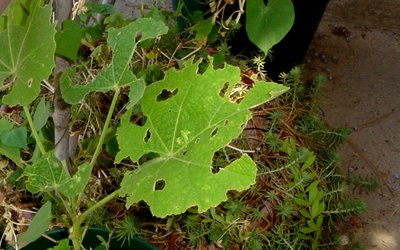
They adore hollyhock leaves -- among other tasty goodies from the garden. As a result, I've had to start my hollyhocks indoors in pots; young plants in the ground are decimated by snails and their peers, the slugs.

Here's a better picture of one of today's snails. (I've finally discovered how to do close-in shots with my little Sony.)
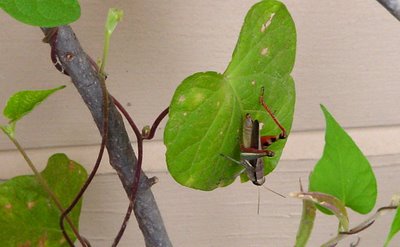
The critter above is the guilty party for the munched out hollyhock leaf, to be perfectly honest. (I had that particular plant in a container on the porch, safe from snails.) The several kinds of grasshopper emerge later in the season than the snails; this fellow has neatly striped legs, if you look carefully. By the way, I don't spray any of the critters because I have a dear cat (DC) that wanders the yard.
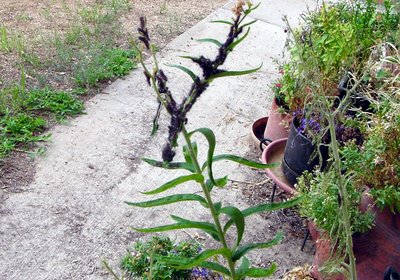
Besides, I got caught up in the behavior of a batch of woolly bears that discovered my Martha Stewart milkweed (the Peruvian variety.) A batch of these fuzzy caterpillars appeared of a sudden and began munching out on this single plant.
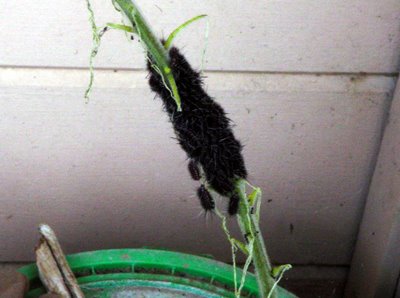
One morning was overcast and cooler; the critters were huddled together, to keep warm, possibly.
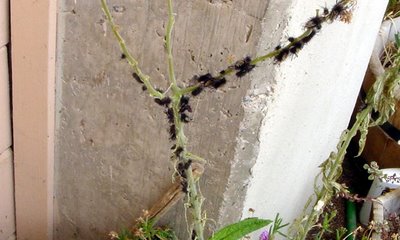
Here they have nearly denuded the milkweed stem.
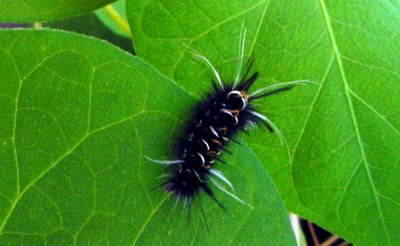
Yesterday they abandoned the now leafless milkweed and spread out, hunting for more food.
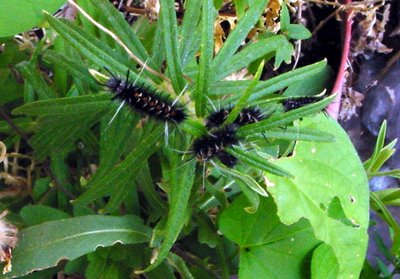
And guess what -- though I hadn't realized it, there was another, smaller milkweed a good six to eight feet away in another large pot. But those woolly bears found it and started gathering again this afternoon.
Of course, it was time to consult The Google, to see what I could learn about woolly bears with such finicky eating habits. Took some drilling down, but I found out that they are tiger moth larvae -- in particular, a variety of (surprise) milkweed moth.
With 21 species of tiger moth reported in Yavapai County, we have just one kind of milkweed moth (Euchaetes antica). The picture of the Oklahoma variety sure bears a family resemblence to my crop.
Don't ask me what I'm going to do next. Maybe get rid of the woolly guys and save my #2 milkweed...maybe keep watching them to see what they do next. I have to decide tomorrow.
Next Day: At 9 a.m. I went downstairs to pick up the papers. #2 milkweed stripped bare -- and woolly bears nowhere to be seen. I suppose they have scattered, looking for yet another milkweed. And I have only one -- located a good 30 feet away, in the ground, as opposed to my garden of pots. When I took a quick glance, some had already found it.
Also I noted on the skeleton of the original plant that the little black dots I had seen earlier were now more the size of rain drops and developing the same sorts of bristles as my earlier crop!
What a quandry! Hate to say it, but I'd probably destroy the hungry little buggers.
ReplyDeleteThey do not belong in my own personal backyard ecosystem.
Well, you are probably right. Virtue,as the saying goes is its own -- and only -- reward. See my new note.
ReplyDeleteWhat an incredibly beautiful caterpillar! I'd be hard put to kill it. Not that I never would - I just very rarely do.
ReplyDeleteStinkbugs, I like to kill. They finally did in my beautiful blue passionflower vine - but left the red one intact. grrr!
Are you sure the milkweeds are dead? Often, a host plant has evolved to deal well with these indignities. My Desert Rose gets periodic Gulf Frittilary attacks, where it's totally denuded of leaves - then, within a couple weeks, is full of leaves again, and bursts into exuberant bloom.
The milkweeds are perennials, so my guess is that the big one,at least, will come back next year. I can hope about the other plant. My usual treatment for the snails is to toss them into the road in front. I figure that if they make it, they're survivors. The 7 caterpillars I found on my in-the-ground milkweed I carried across the street & left to their fates. Don't know if I'm soft- or hard-hearted. Or just a wuss.
ReplyDelete